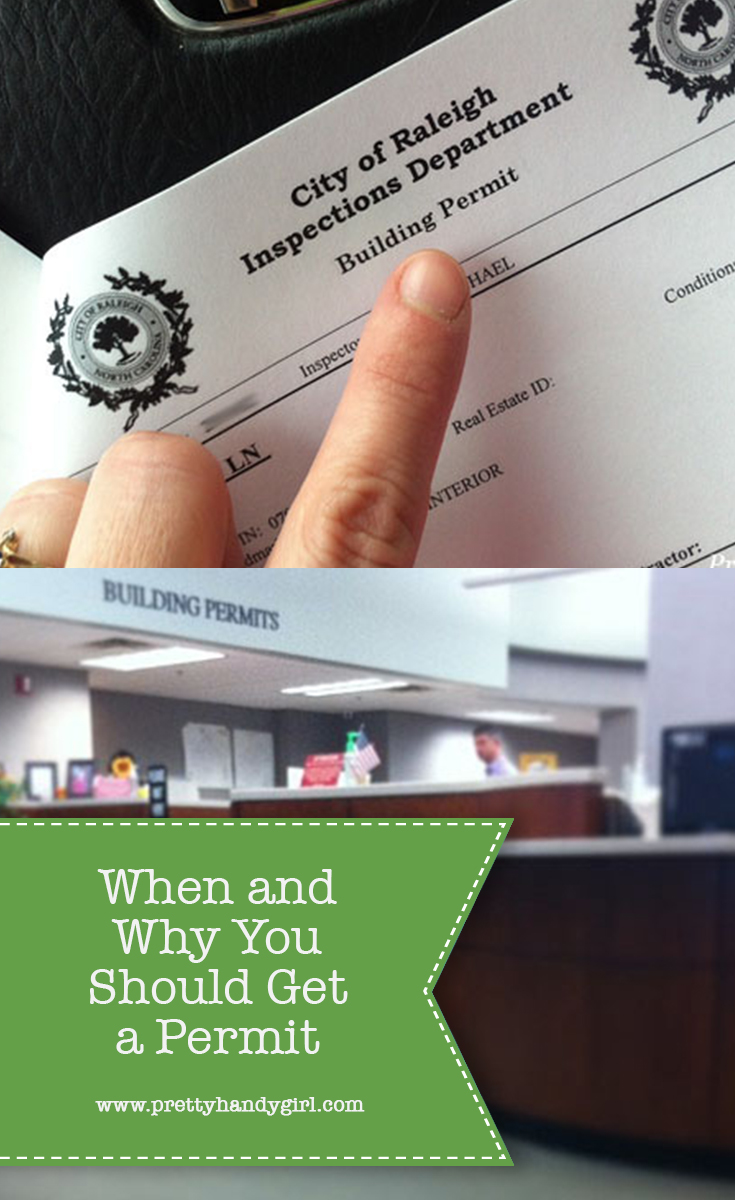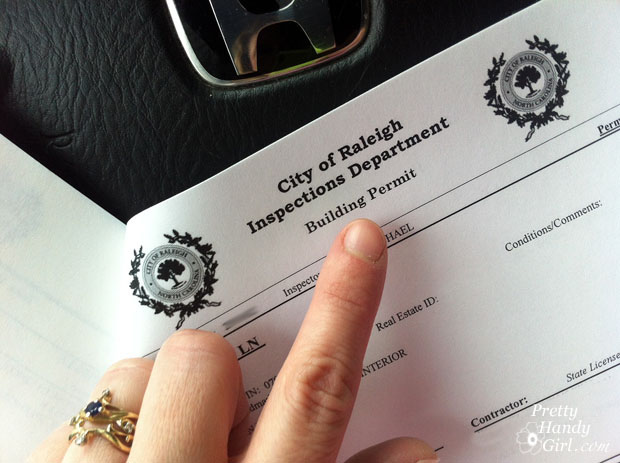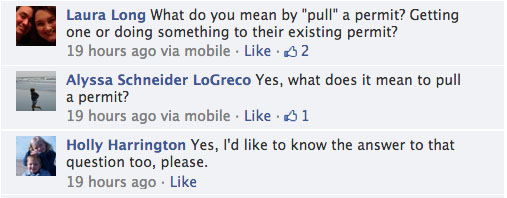When and Why You Should Get a Permit
When and Why You Should Get a Permit
Have you heard the horror stories about filing for a permit and the subsequent inspections? Did you hear the tale about the inspector that made the electrician pull everything out and start over? Have you been warned not to file a permit because you might “open a can of worms”? What exactly is a rough-in? And why do people say “pull a permit” instead of file for a permit? Don’t let misinformation put you and your family at risk. I have the answers to these questions and why you would want to file for a permit before starting your next home improvement project.
Last week I drove downtown to file for a building and electrical permit with Wake County, NC, but found out we are in the Raleigh City Jurisdiction for building permits (but that’s another story for another day.) Before I went to the permit office, I asked Barry Mooneyham, Chief Code Official of Wake County if I could have a little of his time to ask him some questions. It was a very informative 3o minutes, which completely changed my perspective on permits. I left his office with a new found appreciation and understanding of permits and inspectors.
Before I get to Mr. Mooneyham’s answers, I want to answer a recent question that some of my readers posted on Facebook:
Laura, Alyssa & Holly, thanks for asking. I was unsure of the origin on the term “pulling a permit” myself, so I did a little research.
Why do people call it “pulling a permit” instead of filing for a permit?
- The joke answer: Ever try getting a building permit? It is like trying to pull a tooth!
- The possible real answer: It’s called “pulling” a permit because the people in the office have to “pull” the paper work out of a filing cabinet.
Having “pulled a permit” last week I can tell you that it really wasn’t hard. I did print out the paperwork online before heading downtown. This was invaluable because I was able to answer all the questions ahead of time. Some of the information that was required for the permit is:
- Description of work
- Cost estimate of work being done
- Square footage of space being renovated.
- Lot number
- Contractor information (including email, phone number, license number and address.)
- How long do you intend to stay in the house?
- And more questions if we intended to add square footage to our home (not in the scope of our current project.)
And now, let’s turn to my local expert, Mr. Barry Mooneyham, Chief Code Official for Wake County, NC for some answers to questions about permits and inspections:
1. Why is it necessary to file for a permit?
A permit will insure that you meet certain criteria and safety concerns in relation to:
- Zoning requirements
- Environmental (waste, water systems, and run off)
- Building codes
- Electrical codes
- Mechanical codes
- Have a record of your renovation/addition/or building project to show the bank, insurance company and future homeowners that there was a permit pulled and the work was deemed safe for the dwelling and done according to current codes.
How do I file for a permit? Do I take my ideas on a piece of paper or do I need ‘official’ plans?
- Be sure to fill out the forms completely. Look for your county, city or state development guides online to familiarize yourself with building codes. Codes will vary depending on your geographic location and based on your job scope. Overall, there are not a lot of differences between codes for different locations, but it is your responsibility to read up on your codes. (My side note: For our kitchen renovation, I didn’t need to show any plans.)
Is there a way to get an estimate of the cost for the permit and inspections?
- Most of the fees are usually listed online or you can call your local permit office and ask them the cost for your permit and inspections. In our area, the inspection costs are built into the permit fee. The fees are dependent on the square footage of the project and the scope of the project. However, if a re-inspection is necessary, there are re-inspection charges. The permit covers the first inspections (rough-in and finals). Failure to file for a permit before starting work would lead to double fees.
What are the top reasons people don’t want to pull a permit?
- The main reason a contractor won’t want to file for a permit is that they don’t want to meet code or can’t meet the code. And this contractor may not be licensed to do the work you are asking him or her to do.
I’ve heard that when renovating an older house and a permit is pulled, it can open you up to the need to bring everything up to current code? Is there anything that is “grandfathered”?
- If a wall is opened and there are things that are accessible that aren’t up to current code, you will be required to make those alterations and adjustments. But, an inspector normally won’t ask you to gut your home to make everything up to code unless it is a real safety issue.
What is the most common home improvement projects that homeowners complete without pulling a permit (that they shouldn’t do without a permit)?
- #1 Finish empty space over garage.
- #2 Finishing a Basement
- # 3 Finishing an attic.
These type of renovations do require building permits. A lot of times, there needs to be additional electrical to meet the requirements for a finished space. Or an egress needs to be provided for emergency exit.
What are the ramifications if a homeowner doesn’t pull a permit?
- The electrician/ plumber/ tradesperson that says you don’t need a permit (and is a licensed tradesperson) will be turned into the boards. The trade boards will decide how to proceed, but that person could be stripped of their license. It is likely if a tradesperson tells you that you don’t need a permit (and you really do) he or she doesn’t have the license to be doing the work and therefore can’t pull a permit. Do you really want this person working on your home?
- If a homeowner does work without a permit and asks for forgiveness later. The fees for the permit and inspections will be doubled. You may also be required to undo or open up work for the inspections. It is so much easier to file a permit ahead of time. If in doubt, call your local building and planning office.
Are there any renovations or simple upgrades to a residential home where you don’t need to pull a permit?
- Light fixtures, toilets, sinks, simple changes in fixtures that doesn’t require moving anything. However, It is a good idea to follow the manufacturer’s instructions to be sure that you install or change the fixture properly.
What if you buy a house that had an addition or changes and there wasn’t a permit pulled? Can a permit be filed for and inspections done after the fact?
- Yes, you can file for a permit retroactively. But, it could involve uncovering or exposing work that was done. It is to your benefit to make sure that permits were pulled for work done on a house you are considering buying. Real Estate agents are required to disclose if a permit wasn’t filed. If you are the homeowner who did an alteration to your home without pulling a permit and you get ready to sell. You will be charged double fees to get the permit after the fact. In Wake County, you can’t do your own repairs if you are going to move within 12 months. If you plan to live in your home a long time you can make your own repairs.
- They aren’t going to chase down a homeowner that didn’t pull a permit.
- You should be aware, that even if a previous owner did a renovation and didn’t have a permit, the permit responsibility goes with the current homeowner. Which means that when you go to sell your house, you could be required to have a permit for that addition that the previous owner did.
How can you tell if a permit was pulled for your home’s renovations?
- If your local government has online real estate records, you can look there. Otherwise, you can call your local building, planning and inspections office. (In Wake County, permits filed before 1986 may not show up in the online records.)
What happens after the permit is pulled?
- You can proceed with the rough in work (plumbing, wiring, building, etc.) When the electrical wires and boxes are put in you are ready for the rough-in inspection. Keep walls exposed if sheetrock has been removed so the inspector can thoroughly inspect the work.
I assume an inspector comes out for a “rough in” inspection. What exactly does that mean?
- All trades have rough-in inspections. It refers to bringing wires into boxes. Running plumbing or lines fixtures are not hooked up or attached yet.
What and how is the final inspection done? What will the inspectors be looking for?
- Everything that is outside walls and in plain view will be looked at. Occasionally, covers may be opened to look at connections. Plumbing inspectors will look for caulking and to insure fittings are connected and sealed. Heating and cooling systems must adhere to current codes.
Why and how are codes written?
- Some are written by firemen and are regulated by insurance company. More recently there have been changes to codes to take into consideration energy savings and environmental concerns. Building codes are written to keep you and your home safe. Insurance companies are very invested in making sure that you keep your home safe when adding onto or making repairs to you home because they have a financial interest in your property when you have insurance.
Can I be my own contractor?
- Absolutely, as long as the project is under $30,000.
Any tips for making the process of applying for a permits and inspections more smooth for homeowners?
- Take your time to read through the development guides for your locale. They will spell out what codes you need to meet and help you pass your inspections.
And now for the Specific Reader Questions:
Do we need to pull a permit to put up a non-loadbearing wall? I have two bathrooms that share a closet, and it’s awkward to hear what’s going on in the other bathroom.
- You could add a non-structural, non-load bearing wall (at a cost of less than $5,000) without a permit. Be aware, that if it involves useable wall space, you will need to add electrical if your wall is more than 2′ wide. The code in our area states that outlets must be within 12′ of each other, and less than 6′ from a corner. Adding or moving electrical does require filing for a permit.
We are replacing our cabinets in our kitchen and installing a new vent hood (same exhaust ductwork and electrical). We aren’t taking down any walls or even changing the layout. One contractor we talked to suggested we would need a permit. Is this true?
- Yes, you will need a mechanical permit. But, you can do the installation yourself, just be sure to follow the instruction manual from the manufacturer. Depending on the strength of the new hood, you also might need an air return.
A reader was told that insurance companies won’t pay out on a fire claim if any work is un-permitted regardless of the cause. Is this true and why?
- Insurance companies don’t have to pay for fire damages if they find out that the fire was caused by work that wasn’t to code.
If you are renovating a room (for example a bathroom or kitchen) and replacing the fixtures but everything is in the exact same spot, do you need a permit?
- Replacing a fixture like a toilet, sink or light fixture is fine to do without a permit. But, if you change or move any plumbing or electrical you do need a permit.
I’m moving out of a house that has a laundry room on the second floor between the bedrooms. I want this in every house I have until forever now, it’s so handy! Do I need a permit to move the plumbing and vent?
- Yes. Anytime you are moving plumbing, HVAC and electrical you will need a permit.
My husband wants me to ask if there are any codes in relation to a window seat being built in a bay window?
- Not that I’m aware of.
After my interview, I realized that the inspectors actually work for the homeowners. They protect homeowners and business owners from mistakes, especially dangerous life threatening one.
I really appreciated that fact this week as I had to navigate how to make repairs to termite damage. Our building inspector came out to our home to meet with me and our termite company to help figure out the best way to make the repairs. I can’t begin to tell you how reassuring it was to have this expert in my corner to make sure the repairs are done correctly.
Plus, the building inspector now knows our whole story and he took some time afterwards to see if there were any other issues I needed to address. This is exactly why it is important to get a permit! The inspectors are a third party intermediary. They want your home to be safe and can go to bat for you against any sub-contractors you hire.
You might want to watch this video for additional information on permits:
Disclaimer: This interview and the information contained in this post may not pertain to your local permit, inspections and code requirements. Be sure to contact your local building, planning and inspection offices to ask any questions you may have about your own home and future projects.
You can read more about our kitchen disaster and renovation in these updates:
- Polybutylene Pipe Leak turns into Moldy Mess
- My World Upended, Asbestos Discovery and Removal -All You Ever Wanted to Know About Asbestos
- Planning New Kitchen Layout and more
- Planning Colors and Materials for the New Kitchen
- Let the Demolition Begin
- How to Remove Soffits
- Move Back in the Kitchen Temporarily and Throw a New Year’s Party
- Termite Damage and Kitchen Update
- Everything You Should Know about Termites and Termite Damage
- Structural Engineer Plans and another Kitchen Update
- How to Survive without a Kitchen During Renovation
Pin for later!








What about when replacing worn out flooring? Also, our home is a tri-level and the basement level was roughed out – meaning plumbing and electrical was done, it was studded with insulation, but no drywall was hung and no flooring was laid. Would this still require a permit? What are they going to inspect? Electrical and plumbing was inspected when the home was built. Just curious as there seems to be a lot of “gray” areas that might or might not need a permit.
Tina, my thoughts and understanding of most building codes are that you don’t have to get a permit to replace your flooring. Regarding the basement, are you sure a permit was pulled and was a final inspection done? If it were me, I’d ask for another inspection to feel at ease. It’s sooo much easier to spot a problem or hazard before closing up the walls. And so much easier to fix now. Check with your county or city permit office and see if they can do an inspection without a permit. Explain to them the situation.
Great post, it really spells everything out. Around here you have to bring them plans (you can draw them yourself) of what the area will look like before and after. That’s the thing I find most daunting about the permit process.
Super-helpful post! Especially with looming kitchen and bathroom renovations on the horizon!
So, I JUST commented on your post about replacing outlets, and my flaky electrician that wouldn’t get back to me with my estimate,THEN when I received it it said EXCLUSIONS-DRYWALL & PERMIT
I emailed him numerous times to ask what Permit Excluded meant.(Yes I know what excluded means,but I couldn’t get my little mind around the fact that a PERMIT was EXCLUDED.) He wouldn’t email me back, and I assumed it’s because he didn’t want it in WRITING that they weren’t going to pull permits TO INSTALL A DEDICATED CIRCUIT. I had to call him, and he told me”For jobs this small,we don’t pull permits.” Ok, well on my city website,that work requires a permit. I was backwards when I called for the estimate, and Googled the company AFTER THE FACT, and learned they are BANNED from bidding on city projects for 2 yrs 2 months-The labor-management committee raised allegations that the company failed to pay prevailing wages on public works projects; failed to provide accurate and complete payroll records; failed to maintain required apprentice-journeyman ratios; failed to pay training fund contributions to apprenticeship programs; and failed to employ certified electricians and to maintain required trainee-certified electrician ratios.
SCARY! At this point, I feel like someone should be told that they are giving estimates and NOT pulling permits,BUT is it my place to be the tattle tale? I don’t want to tattle, but I have this belief, that is you know something is wrong, and you do NOTHING to change it, you are as guilty as the person doing wrong.What do you suggest-report them, or leave it alone?
Thanks!
I’ve been trying to follow your posts by email but none of the links ever work so while I might enjoy your website I enjoy good programming more. I’ve tried to unsubscribe so I could tell you this privately but your unsubscribe doesn’t work either.
Lynne, I’m so sorry you are having issues with the emails ;-(. I’m emailing you now.
The post was very informative Brittany. This is very helpful for someone like me who’s planning to remodel my home. Actually, I didn’t think I needed to pull out a permit since I wasn’t going to build a new home but I am simply remodeling it. But having read your post, I changed my mind and since you included all the details I needed to know about pulling out a permit, I am more convinced to pull out a permit now. I think pulling out a permit is the best way to avoid problems.
Awesome info! We made our contractor pull permits for repairing water damage and changing out our siding and windows. So glad we did, because one of the guys that we had give us a bid was so convinced (in his own head) that we were going to choose him that he filed the permits for us. We got audited for his permit, thankfully since the contractor that we used pulled permits, no bad ramifications for us!!!
Practically everything that has been done in my house doesn’t have a permit (not my decision)… We don’t plan on moving, but I worry about what will happen when we do. It is good to know that people do apply for permits after the fact though.
Maude
Just a heads up.. since a lot of information is NC specific.. In California you DEFINITELY have to pull a permit to replace a toilet (due to water restriction guidelines). You also need a permit to replace a water heater (earthquake strapping issues) or if you replace a bathtub. Even if you don’t relocate any plumbing.
A great tip I have is to call the permit office with questions (if you are scared about pulling permits and want to know if you need to before even thinking about a new project.) Usually they will be happy to give you the specifics to the local and municipal codes since from state to state (and even from city to city) things can be dramatically different! And you don’t have to give them your name or anything.
Great post though.. I think a lot of DIY’rs don’t really think about permits (and actually don’t think about keeping stuff up to code) and down the line that can be a big problem!
Great Post! I always thought permits were something to skirt around until I started watching Property Brothers and Income Property. You want to protect your most important asset, so it pays to do it right. Now, why are taking so much time fixing your kitchen? Where are you eating? Ann
Ann, thanks gal. Yeah, I was of the same mindset, but I did a 180 after talking to Mr. Mooneyham. The inspectors are really there to protect us and our homes. And had laugh at your comment, it is taking a while isn’t it. Unfortunately I’m handling most of the details myself. Which means each design and material decision is being researched by myself. So, I’m juggling being a Mom, wife, blogger, contractor and designer all at once.
We have a makeshift kitchen set up in our living room, so we are still able to cook. 😉
Great information! Thank you. Cherry Kay
Thanks ;-).
What an awesome post Brittany! Tons of valuable information here. You are one thorough woman! XO
Thank you so much Colleen. I’m glad you found it useful. I had debated writing this post (because it’s not a tutorial), but Handsome Guy convinced me to.